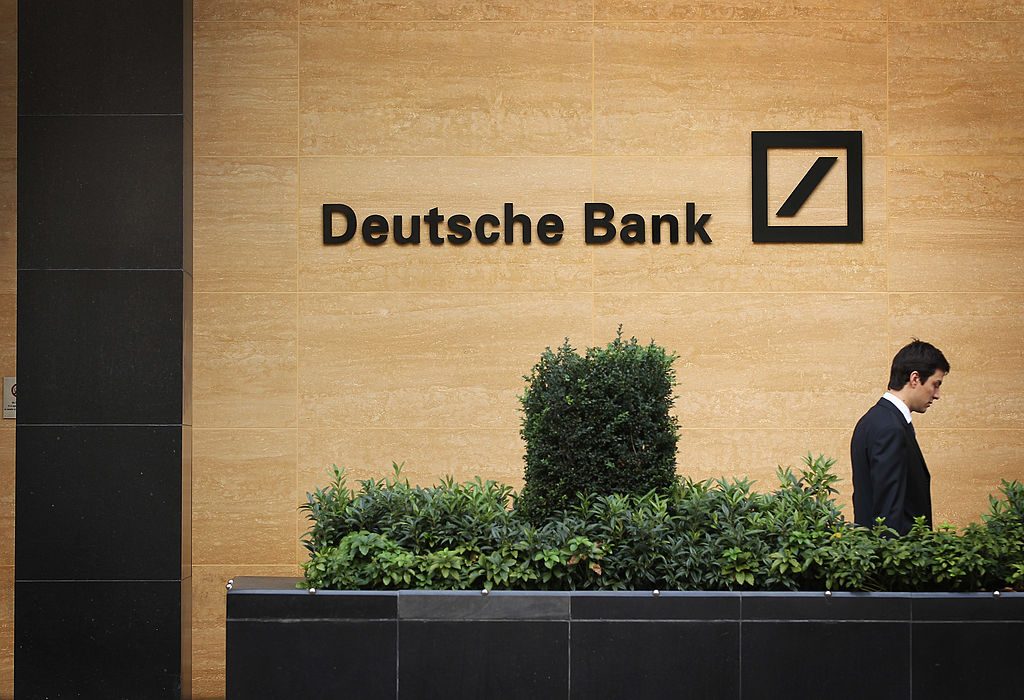Deutsche Bank, Credit Suisse agree to pay $12.5 billion to settle U.S. mortgage cases


A free daily email with the biggest news stories of the day – and the best features from TheWeek.com
You are now subscribed
Your newsletter sign-up was successful
On Friday, Germany's Deutsche Bank agreed to pay $7.2 billion to settle a U.S. Justice Department lawsuit over dodgy mortgage-backed securities packaged and sold from 2005 to 2007. The settlement, which still needs final approval, includes $3.1 billion in fines and $4.1 billion in relief to consumers, primarily through modifying loans and providing other assistance to homeowners and borrowers. The settlement is a partial relief for Deutsche Bank, which had earlier said it might have to pay up to $14 billion to settle the civil charges. Also on Friday, Credit Suisse agreed to pay $5.3 billion in a similar settlement, and the Justice Department filed suit against Britain's Barclays Bank for allegedly misrepresenting the value of the loans it sold investors.
The mortgage-backed securities, much riskier than advertised, played a large role in the 2007-08 global financial meltdown. Other banks that have already settled with U.S. regulators include JPMorgan Chase ($13 billion), Bank of America ($16.7 billion), and Goldman Sachs ($5.1 billion).
A free daily email with the biggest news stories of the day – and the best features from TheWeek.com
The Week
Escape your echo chamber. Get the facts behind the news, plus analysis from multiple perspectives.

Sign up for The Week's Free Newsletters
From our morning news briefing to a weekly Good News Newsletter, get the best of The Week delivered directly to your inbox.
From our morning news briefing to a weekly Good News Newsletter, get the best of The Week delivered directly to your inbox.
Peter has worked as a news and culture writer and editor at The Week since the site's launch in 2008. He covers politics, world affairs, religion and cultural currents. His journalism career began as a copy editor at a financial newswire and has included editorial positions at The New York Times Magazine, Facts on File, and Oregon State University.
-
 Jeff Bezos: cutting the legs off The Washington Post
Jeff Bezos: cutting the legs off The Washington PostIn the Spotlight A stalwart of American journalism is a shadow of itself after swingeing cuts by its billionaire owner
-
 5 blacked out cartoons about the Epstein file redactions
5 blacked out cartoons about the Epstein file redactionsCartoons Artists take on hidden identities, a censored presidential seal, and more
-
 How Democrats are turning DOJ lemons into partisan lemonade
How Democrats are turning DOJ lemons into partisan lemonadeTODAY’S BIG QUESTION As the Trump administration continues to try — and fail — at indicting its political enemies, Democratic lawmakers have begun seizing the moment for themselves
-
 TikTok secures deal to remain in US
TikTok secures deal to remain in USSpeed Read ByteDance will form a US version of the popular video-sharing platform
-
 Unemployment rate ticks up amid fall job losses
Unemployment rate ticks up amid fall job lossesSpeed Read Data released by the Commerce Department indicates ‘one of the weakest American labor markets in years’
-
 US mints final penny after 232-year run
US mints final penny after 232-year runSpeed Read Production of the one-cent coin has ended
-
 Warner Bros. explores sale amid Paramount bids
Warner Bros. explores sale amid Paramount bidsSpeed Read The media giant, home to HBO and DC Studios, has received interest from multiple buying parties
-
 Gold tops $4K per ounce, signaling financial unease
Gold tops $4K per ounce, signaling financial uneaseSpeed Read Investors are worried about President Donald Trump’s trade war
-
 Electronic Arts to go private in record $55B deal
Electronic Arts to go private in record $55B dealspeed read The video game giant is behind ‘The Sims’ and ‘Madden NFL’
-
 New York court tosses Trump's $500M fraud fine
New York court tosses Trump's $500M fraud fineSpeed Read A divided appeals court threw out a hefty penalty against President Trump for fraudulently inflating his wealth
-
 Trump said to seek government stake in Intel
Trump said to seek government stake in IntelSpeed Read The president and Intel CEO Lip-Bu Tan reportedly discussed the proposal at a recent meeting
